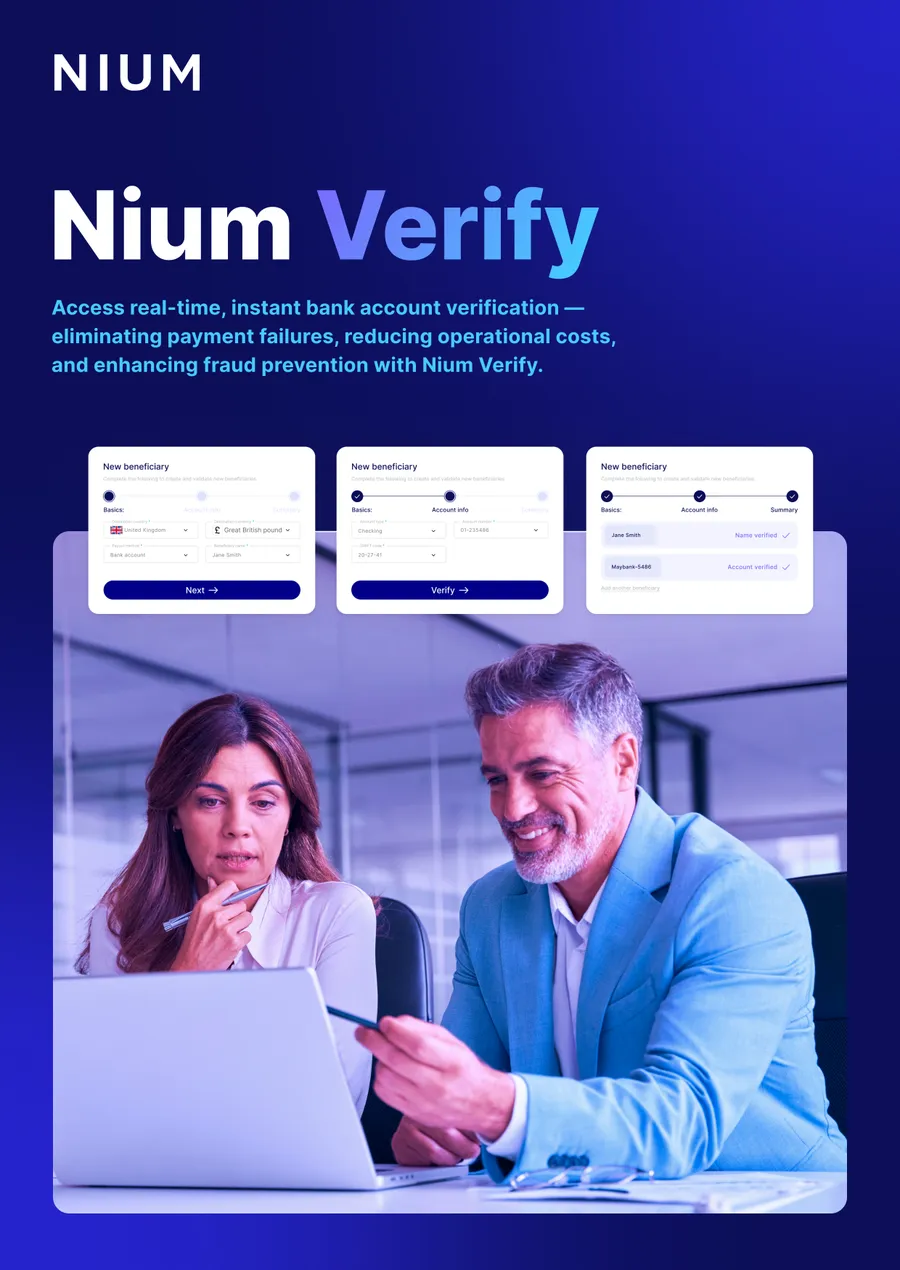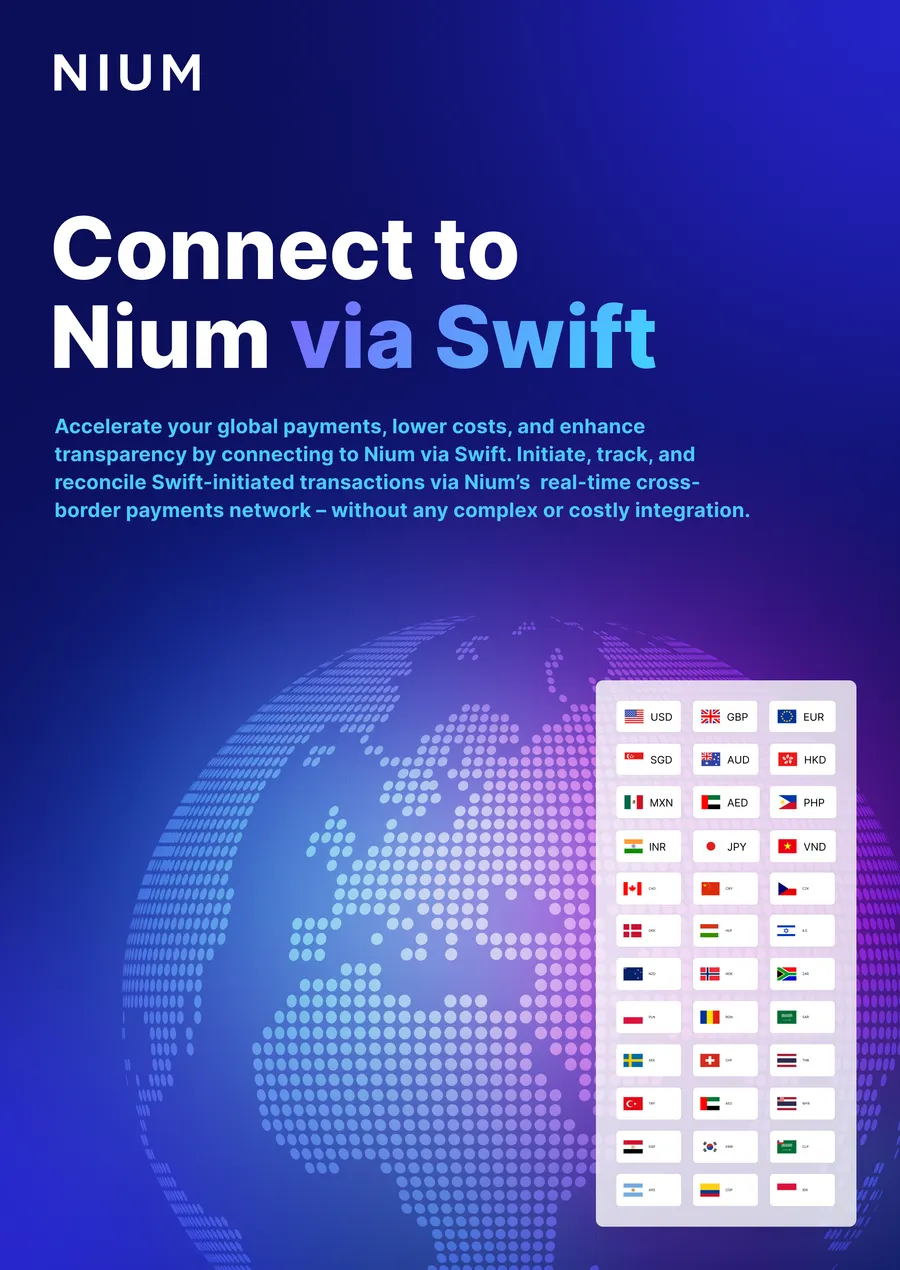Japan’s economic landscape is opening up rapidly, with businesses focusing on cross-border business models, data-driven reporting and consumer convenience. The nation’s payment infrastructure, which had, for a time, lagged behind global payment trends is adapting, accelerated by official policy and new technology.
For global businesses and financial institutions looking to send money into Japan, having the right tools to move funds quickly, efficiently, and securely will be essential to staying competitive in a fast-paced market. At the same time, Japanese enterprises expanding internationally need modern payment solutions that allow them to send money abroad securely and efficiently to support their growth in global markets.
In 2024, Nium became one of the first global fintechs to be issued a Type 1 Funds Transfer Service Provider (FTSP) license by Japan's Financial Services Agency (FSA), demonstrating high levels of compliance, security and customer value to set a new standard for B2B cross-border payments into and out of Japan.
This means that banks, financial institutions, and enterprise businesses requiring cross-border B2B payments finally have a genuine alternative to the high-cost, low-speed, traditional networks for inbound and outbound transfers to Japan. But what’s driving the case for embracing change and taking advantage of the opportunities available?
The push for open payments
Until relatively recently, Japan’s payment system has been characterized by a focus on cash – which accounted for 41% of payments as recently as 2023 – and a reliance on domestic banking infrastructure. The result was high prices and limited flexibility for businesses.
According to the World Bank, Japan is one of the most expensive G20 countries to send money from in the world, largely due to market restrictions.
Money service business (MSBs) with a Funds Transfer Service Provider (FTSP) registration were only allowed into the market in 2010, and even then with a 1 million yen ($6,950) cap on transaction volume. While this cap was eliminated in 2021, a lack of Type 1 alternatives meant that the only way to send money overseas without transaction limits was via existing Japanese banks, who levied higher charges on transfers – on average around 7%.
Progress in this area has moved with caution, given the high bar set by the FSA concerning compliance and security, but as global commerce expands and businesses look for faster, more efficient ways to send money around the world, cross-border infrastructure needs to adapt.
Nium’s Type 1 license, which allows transfers of up to 50 million JPY per transaction via Zengin-net, creates a new opportunity for businesses both inside and outside Japan to move money more flexibly, efficiently and securely.
As Masayasu Heishi, Nium Japan Country Manager, explains, “We’re entering a period of market diversification that will affect every area of the payments industry. Businesses targeting markets beyond Japan’s borders, as well as those outside looking to do business here, will need to focus on implementing the most convenient, secure and cost-effective payment methods to manage their capital effectively.”
Broadening the possibilities of payments
In an increasingly open global marketplace, payments have the potential to be a key commercial driver for businesses.
Whether broadening supply chains, managing customer remittances or paying a global workforce, the ability to send and receive funds quickly, securely and cost-effectively gives businesses the ability to manage resources, priorities and investments on-demand, adapting to new opportunities at scale and reducing risk.
But this requires moving beyond legacy payment methods such as wire transfers and banking correspondent networks, with their attendant high costs, slow settlements and opaque transaction journeys. Working with a modern, Type 1 payment partner like Nium brings payments into real time, offering faster, more transparent transactions.
This means that EMI-licensed financial institutions, businesses and fintechs can tap into Nium’s global payment infrastructure to streamline transfers into Japan, while Japanese enterprises can use Nium’s extensive payout corridors to send funds quickly and securely to partners, suppliers, or subsidiaries across borders.
With a Type 1 license, Nium can offer unique benefits to businesses, banks and financial institutions, including:
- Enhanced speed and efficiency: Nium’s global real-time payment infrastructure helps businesses send and receive cross-border transactions faster and more efficiently than ever before, including adapting payments to local preferences, such as instant payments or digital wallets.
- Regulatory confidence and compliance: Achieving a Type 1 license in Japan requires meeting stringent regulatory standards. Nium’s protocols, technology and policies have been examined in depth by the FSA to ensure compliance, so businesses and payment providers can expand cross-border payments with confidence, knowing they are backed by the highest levels of expertise and security.
- Global reach with local expertise: Nium’s global payout network of 190+ countries and local bank integrations enable businesses to expand their networks without the need for extensive system restructuring or new banking partnerships.
- Higher transaction limits: With a Type 1 license, Nium can process significantly larger transactions (up to JPY 50 million per payment) compared to the JPY 1 million limit under a Type 2 license. This allows businesses to move high-value payments more efficiently and cost-effectively, opening new opportunities for scaling operations in Japan and beyond.
This can change the way businesses plan and execute their global operations, says Masayasu Heishi. “Partnering with a Type 1 fintech cuts the cost and risk levels for market or product expansion, without the need for payment system upgrades. That means businesses can follow opportunities wherever they arise, across borders, without worrying about complex compliance, expensive new systems, or fraud.”
Meeting the future on its own terms
The dynamic changes in Japanese economic investment and overseas engagement, such as growing foreign investment, Japan’s record levels of exports and a fast-expanding eCommerce sector projected to reach US$263.4 billion by 2029 are creating real opportunities both at home and abroad.
By working with a Type 1 partner, businesses and financial institutions can streamline their capital flows in and out of Japan to grow their agility, efficiency and competitive advantage.
As Masayasu Heishi explains: “Payments are the essential engine of growth – no matter your industry or business model. Our goal is to bring global expertise and real-time payment infrastructure to enable business to thrive, across borders, industries and models, to create true, connected value.”














